The emergence of artificial intelligence- AI in legal practice has impacted number of industries globally, and the legal profession is no exception. The legal sector in India is also experiencing a revolutionary period due to the adoption of AI.
Until a few years ago, legal practice was extensively dependent on human skills which resulted in lawyers spending hours on research, documentation, drafting, and litigation.
AI-based tools are now transforming this picture by automating mundane work, simplifying case analysis, and accelerating the decision-making process.
The judicial system of our country is held back by a huge backlog of cases , which calls for an escalating need for legal services and increasing demands on law firms and courts to work more efficiently.
AI provides a practical solution to these issues by bringing cutting-edge technological capabilities into the legal arena.
It is proving to be a game-changer in tackling these challenges, bringing powerful technology into the legal field.
It helps lawyers sift through massive databases in seconds, cutting down research time and making it easier to find relevant cases and laws.
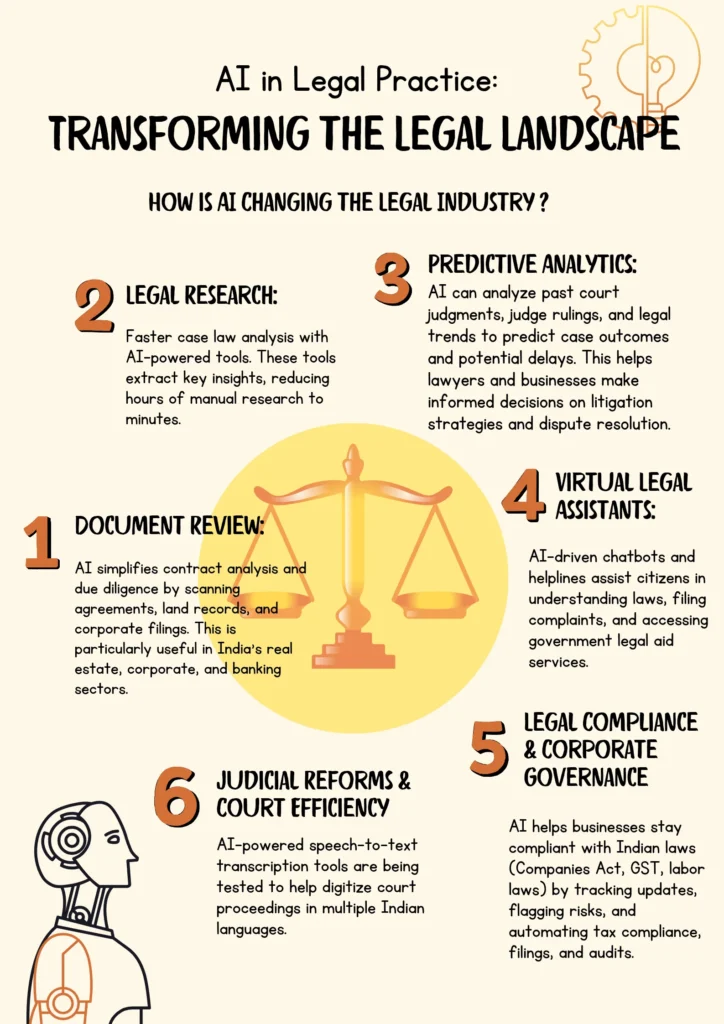
Although AI brings positive changes with the rapid transformation in the field of law, it also raises crucial questions.
- Will AI eventually replace lawyers?
- How will it shape job opportunities in the legal profession?
- Whether or not it is ethical to rely on artificial intelligence for a job that is majorly dependent on morality and human judgement?
Through this post, we will understand how AI is reshaping legal practice in India, explore its pro/cons and the future of AI-driven legal innovation and help you stay in tune with the fast-paced world.
Table of Contents
Revolutionizing Legal Research: AI in Legal Practice
Legal research is one of the most time-consuming process for lawyers but the introduction of AI has transformed this aspect.
Whether you’re a lawyer, judge, or law student, AI tools help you find relevant legal information quickly, making research much more efficient.
Here are some of the most widely used ai-driven platforms in India:
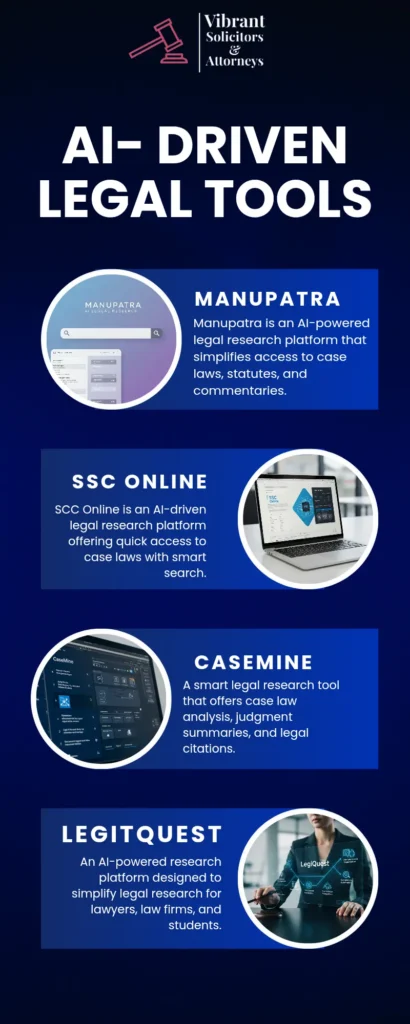
1. Manupatra
One of India’s leading legal research platforms, Manupatra provides access to a vast database of case laws, statutes, and legal commentary.
AI Features: Uses Natural Language Processing (NLP) to refine search results, suggest related cases, and summarize judgments for quicker analysis.
2. SSC Online
It’s a go-to legal research platform for anyone looking for comprehensive access to Indian and international case laws. It provides a vast collection of Supreme Court, High Court, and tribunal judgments, along with statutes, notifications, and legal commentaries.
AI Features: SCC Online is designed to make legal research not just faster, but smarter. Its advanced search filters allow users to refine their searches using specific keywords, case citations, or even full-text queries.
3. CaseMine:
It’s an ai-driven legal research tool made to help lawyers, law firms find case law and precedents more efficiently. It goes beyond basic keyword searches by offering deeper insights into case precedents, making legal research faster, smarter, and more intuitive.
AI Features: CaseMineunderlines significant legal ideas , suggests references and uses predictive analytics and machine learning to draw similarities between related cases.
4. LegitQuest
Instead of spending hours analyzing lengthy judgments, LegitQuest helps users quickly find relevant legal information with in a structured manner , saving both their time and effort.
AI Features: A feature that makes it stand out is “iDRAF“ (Issue, Decision, Reasoning, Argument, and Facts), which breaks down complex judgments into clear, easy-to-read sections. It makes it easier for users to grasp concepts in a glance.
AI in Predictive Analytics
One of the most fascinating use of AI in legal practice is it’s ability to predict likely outcomes of cases. With the application of predictive analysis , it is able to go through extensive amount of prior case rulings, judicial trends and patterns.
Litigators and law firms are already taking advantage of this feature to take calculative steps in order to avoid risks and curate stronger legal strategies.
Artificial Intelligence is able to recognise patterns that human researchers might be unable to identify. Tools driven by AI examine elements that help with learning even the success rates of certain arguments.
For clients, this means improved legal counsel and a more comprehensive understanding of possible risks prior to appearing in court.
AI’s contribution to legal prediction is anticipated to increase with it’s further development, assisting the Indian legal system in becoming more data-driven, effective, and strategic.
But in order to make sure that AI does more than just forecast justice,it will be important to uphold equity, and human oversight.
Virtual AI Legal Assistance
With the use of online platforms, chatbots driven by artificial intelligence, and human legal experts, virtual legal aid is becoming more and more popular in India.

Online platforms, AI-powered chatbots, and human legal professionals are driving this trend, which makes legal aid more practical, economical, and effective. By eliminating the need for in-person trips to law offices or courtrooms, online legal services enable people and businesses to obtain legal advice while saving time and money.
Artificial intelligence (AI)-powered chatbots let users easily understand legal intricacies, prepare papers, and provide immediate answers to frequently asked legal questions.
Furthermore, human legal professionals accessible via virtual conferences guarantee customized legal counsel catered to situations.
The increasing use of technology in the legal industry is changing the way that legal services are obtained and provided in India.
AI in Legal Practice- Document Review
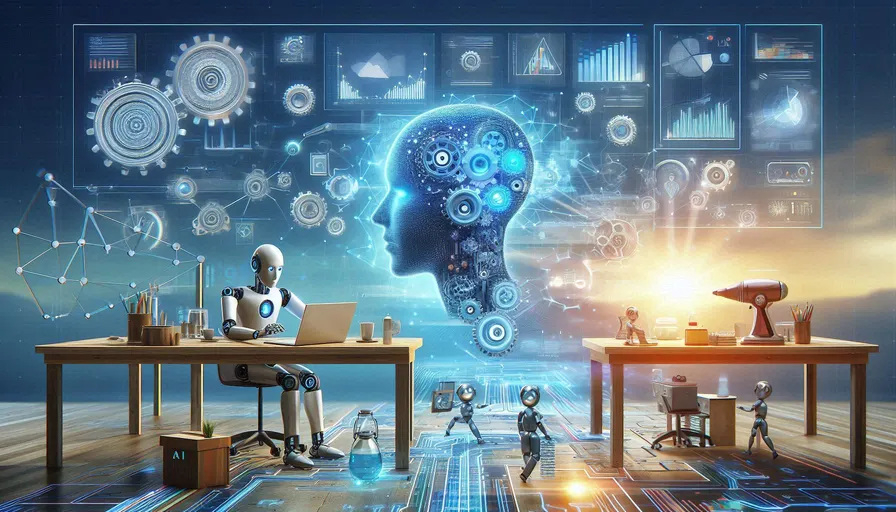
By improving efficiency, accuracy, and cost-effectiveness, artificial intelligence is revolutionizing document review in Indian legal practice.
AI-powered solutions for contract analysis, legal research, compliance checks, and litigation support are used by enterprises and law firms.
Key Applications of AI in Legal Practice
- Contract Review: Finds important terms, dangers, and discrepancies.
- Legal Research: Uses AI-powered technologies to expedite case law study.
- Litigation Support: Evaluates prior rulings to help with case planning and forecasting.
- E-Discovery & Due Diligence: Automates document analysis for litigation and corporate transactions.
Benefits and Challenges of AI in Legal Practice
| Benefits | Challenges |
|---|---|
| ✔ Faster document processing ✔ Cost reduction ✔ Improved accuracy ✔ Scalability for large cases | ❌ Lack of AI-specific legal regulations ❌ Data privacy concerns ❌ Dependence on high-quality training data |
Ethical & Legal Challenges
Significant ethical and legal questions accompany artificial intelligence’s increasing integration into India’s legal system.
Although AI in legal practice has the potential to increase productivity and accessibility, it also brings up issues with data privacy, bias, accountability, and the possible abuse of legal insights produced by AI.
It is essential to address these challenges to ensure that AI-driven legal solutions uphold justice, fairness, and confidentiality.
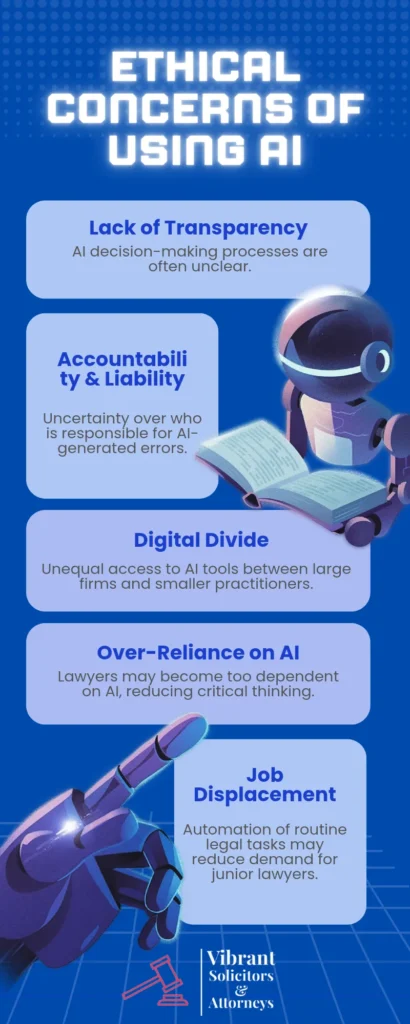
Key Concerns of AI in Legal Practice
1. Data Privacy & Confidentiality
Legal artificial intelligence systems handle large volumes of privileged and sensitive client data including corporate legal documents, contracts, and case records.
Particularly in a nation where data protection laws are still developing, maintaining confidentiality, and averting data breaches are of utmost importance.
Compliance with the Digital Personal Data Protection Act, 2023, AI-driven legal platforms must align with this law to ensure that personal and client data is collected, stored, and processed lawfully.
2. Accuracy & Bias in AI Decisions
To produce insights, AI in legal practice examine past case law, rulings, and legal texts; nonetheless, the accuracy of these models depends directly on the quality of the data utilized for training.
It may reinforce existing inequalities in the justice system.
3. Liability for AI Errors
If an AI-powered legal tool misguides a client, leading to financial or legal consequences, determining liability is unclear under current Indian laws.
4. Job Displacement
Contract evaluation, legal research, and document preparation are just a few of the labor-intensive, repetitive legal jobs that AI is gradually automating.
In the past, junior attorneys, paralegals, and interns did these responsibilities, giving them valuable experience and chances for professional advancement.
Firms may depend less on entry-level legal professionals as AI-powered tools expedite these procedures more quickly and accurately, which would mean fewer job openings for recent graduates.
5. Digital Divide
Although the use of AI in legal practice is revolutionizing the field, not all attorneys have equal access to these developments.
Only well-funded firms may be able to fully benefit from AI-driven efficiency in the legal profession as a result of the growing divide between tech-enabled firms and traditional practitioners.
Legislators and legal tech firms need to support open-access, reasonably priced AI tools for all.
Also Read: Fully Understanding The Rise of AI-Powered Cyberattacks
Employment Impact: Threat or Opportunity?
Discussions over whether artificial intelligence will replace attorneys or open up new opportunities have been triggered by the growing use of AI in the legal field.
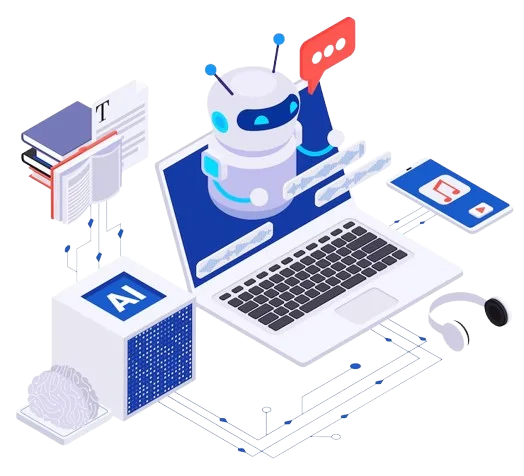
Even while AI can automate a lot of repetitive legal activities, it is devoid of the human judgment, moral reasoning, and interpersonal skills that are critical to the field.
AI is changing the legal sector rather than displacing workers; instead, it is forcing professionals to acquire new skills and positions.
Will AI Replace Lawyers?
Even though AI in legal practice can automate routine tasks, practicing law requires advocacy, negotiation, and critical thinking—skills that AI cannot replace.
AI is probably going to enhance legal professionals’ jobs rather than replace them, freeing them up to concentrate on intricate legal issues.
Moreover, legal practitioners need to acquire new skills in AI-driven legal procedures in order to adjust to the evolving environment.
AI literacy must be incorporated into professional training programs and law schools in order to prepare aspiring attorneys for a future in which AI is a common tool rather than a novel one.

Changing Job Roles in the Legal Industry
AI integration is not just automating legal labor; it is also changing current professions in the legal sphere and opening up new employment prospects.
1. Rise of Legal Technologists –
With the growth of adoption of AI in legal practice , law firms are staffing legal technologists specialized in AI-powered legal solutions.
By assisting organizations in using AI tools for research, case management, and predictive analytics, these experts help close the gap between law and technology.
2. AI Compliance & Ethics Experts –
As AI becomes more prevalent in legal decision-making, there is a growing demand for professionals who can guarantee ethical AI use, guard against prejudice, and handle data privacy issues.
Regulations pertaining to AI-driven legal practice will be shaped in large part by experts in AI compliance.
3. AI-Assisted Mediators & Arbitrators –
AI-powered mediation systems are starting to show up as Online Dispute Resolution (ODR) picks pace in India. Alternative conflict resolution will present new employment opportunities for attorneys with expertise in AI-assisted arbitration and mediation.
4.Tech-Savvy Law Firm Roles –
To incorporate AI into legal procedures, traditional law firms are increasingly employing IT consultants, legal engineers, and AI professionals.
Lawyers with skills in both law and technology will have a competitive edge in the shifting work environment.
Final Thoughts
AI is a force for evolution in the legal sector rather than a threat.
For those who welcome technological advancement, it will open up new windows of opportunities while also replacing certain repetitious duties.
Legal practitioners with the ability to integrate legal knowledge with AI expertise will be the ones of the future, ensuring that technology and law collaborate to improve accessibility, efficiency, and justice.
The future will be led by practitioners who evolve with artificial intelligence; rather than them being replaced.
The Future of AI in Indian Legal Practice
Although the adoption of AI in legal practice is still in its infancy, it shows an abundance of promise. AI tools will continue to improve legal accessibility, cut down on delays, and lower the cost of legal services as they keep on advancing.
To ensure AI is a weapon for justice rather than a source of bias or data exploitation, rules must change to meet ethical issues.
India’s legal system is probably going to adopt a hybrid approach in the future, with AI-powered efficiency enhancing the ethical judgment, advocacy, and strategic thinking of legal experts.
The legal industry can attain more accuracy, quicker conflict resolution, and more easily available legal services by incorporating AI as a collaborative tool. This will ultimately make justice more intelligent, equitable, and inclusive for everyone.

Conclusion
Unquestionably, artificial intelligence is altering decision-making, improving accessibility, and simplifying procedures in Indian legal practice.
But with its quick adoption come moral conundrums, job changes, and legal issues that need to be resolved.
The legal sector must appropriately utilize AI’s promise rather than viewing it as a disruptive danger, making sure that automation complements human competence rather than takes its place.
